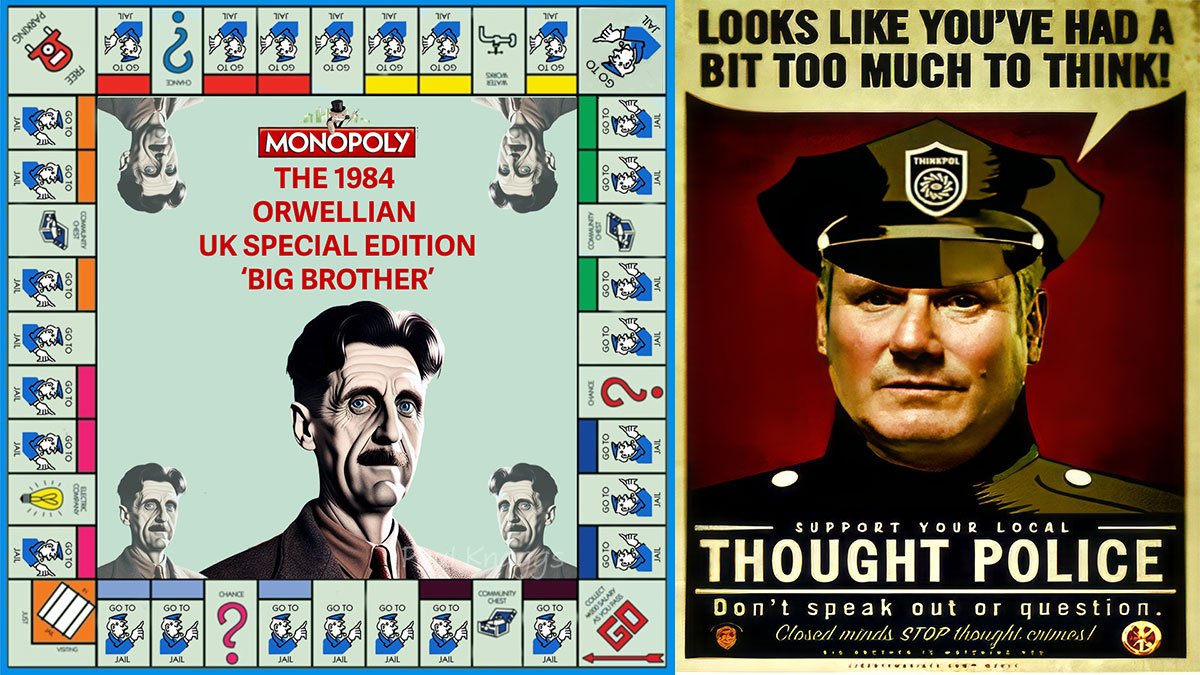banzay13
Emperor
They should made online petition to became Airstrip One, even with maga where more freedom in US 
The crowning irony is that the hole the UK government keeps digging itself deeper into was created by the previous administration, on which the blame for it could once have been placed. The window for repealing or at least significantly amending the law narrows with every defensive government outburst but, even if it doesn’t care about the rights and opinions of its own people, political pressure from the US makes some kind of compromise feel inevitable. The longer that takes, the more humiliating it will be.
This is interesting, but a couple of comments:
If you use a VPN, then you are replacing the ISP who could see all IPs you are visiting (not necessarily the sites!) with the VPN provider who can see all IPs you are visiting. I am not sure who I would trust more not to do that.
- If you do not use a VPN everyone on your local network, those who control your local network (your parents, your school or your employer) and your ISP can all see what sites you are visiting, and if you are using http (not that many clearnet sites support that these days) they can see everything you do and send.
- If you do not use a VPN every site your visit, as well as every advertiser on that site, can see where you live and cross reference that to any other site you have visited. This could be really dangerous.
This is very true, and certainly is a concern. However your ISP knows exactly who you are, whereas your VPN only knows your IP address. It seems to me the worst case of your ISP or VPN handing over your browsing history to third parties is a lot better if it is the VPN.If you use a VPN, then you are replacing the ISP who could see all IPs you are visiting (not necessarily the sites!) with the VPN provider who can see all IPs you are visiting. I am not sure who I would trust more not to do that.
If your parents/school/employer have the desire. competence, and infrastructure to log everything you access, they usually also know how to block access to VPNs (my employer certainly does), so that point is moot.
Whenever I check my externally visible geolocation it gets it pretty close, and I always assume those who could do me most harm would be able to get this more accurately though I do not actually know..With the shortage of IPv4 addresses, ISPs tend to use CGNAT, which makes identifying you by your IP close to impossible for 3rd parties and also makes IP geolocation wildly inaccurate. I just tried a few public geolocation services and some displayed the wrong side of the country. Others got the city correct (or almost correct), but there are millions of people living in this metro area.
If you are using IPv6, then this is much more of a concern, yes.
The system means that photos of people who have never been convicted of a crime have been processed by police with limited legal or regulatory oversight.
The use of passport and immigration data is generally reserved for the investigation of more serious crimes, but The Telegraph has previously revealed that police now routinely use searches on mugshots to investigate most crimes.
Facial recognition technology is not subject to national guidance from either the Home Office or the College of Policing, which provides advice to police on conducting investigations.
Campaigners have now issued a pre-action letter to the Home Office, threatening to sue the Government for an unlawful breach of privacy.
The campaigners say the Government “has taken all of our passport photos and secretly turned them into mugshots to build a giant, Orwellian police database”.
The Government has previously been criticised for failing to create national guidelines for how police should use facial recognition while protecting the privacy of civilians.
Sir Keir Starmer has said he would like to see police expand the use of facial recognition technology, which covers live surveillance cameras on the streets, retrospective searches and a new app for police to take photos and use them to identify suspects.
Sir David Davis, the Conservative MP, said the Government had secretly created a biometric digital identity system by the backdoor, without the knowledge or permission of Parliament.
The use of facial recognition has not been subject to a formal vote by MPs, and the position of Biometrics Commissioner, which was created to monitor government use of sensitive data, was vacant for 11 months until July.
‘Absolutely no democratic or legal mandate’
Silkie Carlo, director of Big Brother Watch, said legal action was required to address a “historic” breach of public privacy.
She said: “The Government has taken all of our passport photos and secretly turned them into mugshots to build a giant, Orwellian police database without the public’s knowledge or consent and with absolutely no democratic or legal mandate.
“This has led to repeated, unjustified and ongoing intrusions on the entire population’s privacy.
“This astonishing revelation shows both our privacy and democracy are at risk from secretive AI policing, and that members of the public are now subject to the inevitable risk of misidentifications and injustice.”
Nuno Guerreiro de Sousa, of Privacy International, said: “This secret program is a dangerous infringement on our fundamental rights to privacy and to express ourselves freely, both online and in public.
“It is especially hypocritical that this is happening in a country that prides itself on upholding human rights. This is why we are standing firm in challenging it.”

Not really. Your VPN provider will know your real IP anyway and then you are only one data breach away from being identified. And since they have your browsing history, that should not be that hard to accomplish. Your ISP is at least bound to local laws, so my ISP is not allowed to store my browsing history. A VPN provider from elsewhere might not be as restrained. That said, if you local laws do not protect you, a VPN provider in a better country might be a good idea.This is very true, and certainly is a concern. However your ISP knows exactly who you are, whereas your VPN only knows your IP address. It seems to me the worst case of your ISP or VPN handing over your browsing history to third parties is a lot better if it is the VPN.
Eh, that probably does not accomplish much. If you are having a fixed line, they have your address anyway. And if you are connecting via mobile, your ISP knows where you approximately are* any time your phone is switched on and is very likely to store that data for some time (depending on local laws).This is a big reason to use crypto for paying for your ISP though (or cash or giftcard), as I mentioned in the OP.
Whenever I check my externally visible geolocation it gets it pretty close, and I always assume those who could do me most harm would be able to get this more accurately though I do not actually know..
I am very much not an expert in these things, but it seems to me that using a VPN splits up the data better.Not really. Your VPN provider will know your real IP anyway and then you are only one data breach away from being identified. And since they have your browsing history, that should not be that hard to accomplish. Your ISP is at least bound to local laws, so my ISP is not allowed to store my browsing history. A VPN provider from elsewhere might not be as restrained. That said, if you local laws do not protect you, a VPN provider in a better country might be a good idea.
Eh, that probably does not accomplish much. If you are having a fixed line, they have your address anyway. And if you are connecting via mobile, your ISP knows where you approximately are* any time your phone is switched on and is very likely to store that data for some time (depending on local laws).
Depends a bit on the exact technical details of your internet access. The location of a consumer-grade dynamic IP address tends to be quite obfuscated. How accurate it can be depends on how many customers draw from the same IP address pool. And ISPs have a financial incentive to squeeze as many people into that as possible.
If you have static IP address, then the location of that tends to be known fairly accurately.
But that is IP address data only. If you have a smartphone, it is prone to leak location data through other channels. And as I said above, if we are assuming access to internal ISP data, the location is known anyway. In that case, the IP would be only one entrypoint and not even a good one (phone number would be much better).
*Edit: well, where your phone is, anyway

About: Wikipedia
"Imagine a world in which every single person on the planet is given free access to the sum of all human knowledge. That's what we're doing." —Jimmy Wales
Wikipedia is a free online encyclopedia that anyone can edit, and millions already have.
Wikipedia's purpose is to benefit readers by presenting information on all branches of knowledge

This is all very muddy. If we wanted to be exact, we would need a distinction between "url", "base url" and "IP", and which of those you mean by "site". But in any case, the last sentences of each list are very much wrong: The network operator can know which IP addresses you send requests to (whether they actually know is a different matter). But not everyone on the same local network can know this: It takes an attack on the network to route traffic on the network through a participant, which should be detectable to you and the network operator. And if the network operator is competent (doubtful, of course), they kick attackers like this off the network. But the important distinction is between something which is readily available, something which is usually not available, but can be made so with some effort, and something which requires an active attack on someone to be available.I am very much not an expert in these things, but it seems to me that using a VPN splits up the data better.
If you do not use a VPN then:
Your ISP knows exactly who you are and what sites you visit.
The sites know your IP address and whatever location data goes along with that.
Anyone on the same network knows what sites you visit.
If you use a VPN then:
Your ISP knows you are using a VPN.
Your VPN knows your IP address and what sites you visit.
The sites know you are using a VPN (probably).
Anyone on the same network knows nothing (or perhaps that you are using a VPN).
This only secures your DNS queries. Which is a popular point for data collection, because it allows the DNS provider to collect data about all base urls you visit and almost everything goes through your main DNS server. But all sites you visit and everything in between still get an IP for you. Because ultimately, they need to know where to send the response to. Remember that everything you fetch from the internet has to be traceable back to you, because you need to get the response and the systems need to know where to send it to. The only question is, how many layers of (intentional or unintentional) obfuscation there are between the site you visit and you. This determines how much effort an attacker would need to spend to trace it back to you. But with unlimited resources, this can always be done.I have not yet got round to figuring it out, but it seems another option is oblivious DNS over https via Anonymized DNSCrypt. Looking at for example this and this it seems no one entity knows your IP address and what site you are visiting which has to be th best solution. I am very far from sure though.
A spokesperson from the Department for Science, Innovation, and Technology (DSIT) said: "We welcome the High Court's judgment today, which will help us continue our work implementing the Online Safety Act to create a safer online world for everyone.


The judgment goes into quite a lot of detail about the correspondence between the Secretary of State and his officials, as well as Ofcom. There's quite a big paper trail. There are many flaws with this government and the OSA but the judgment shows that they very much know what they're doing.

